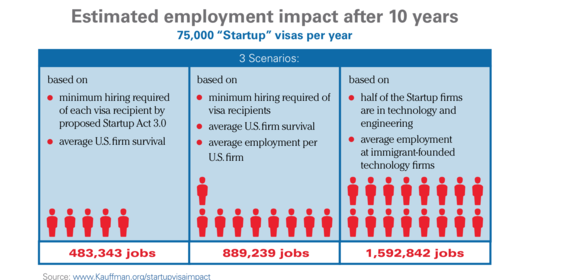SUMMARY
Attracting foreign-born talent and teaching entrepreneurial skills are vital to the economic vibrancy of the United States. The United States needs new programs to recruit and retain immigrant entrepreneurs, strengthen K-12 education, and stress experiential, collaborative learning at all levels of education to create jobs and lead the global economy as the world's entrepreneurship engine.
If every country has a business model, the United States' is entrepreneurial capitalism, in contrast to China's manufacturing, India's cheap services, Japan's and Germany's high-end manufacturing, France's and Italy's production of luxury goods, and other countries' expertise in commodities.
Nonetheless, the United States ranked 6th--behind Switzerland, the United Kingdom, Sweden, Finland, and the Netherlands--out of 143 economies in the 2014 Global Innovation Index, which assessed each country by measuring its institutional environment, education and research quality, physical and environmental infrastructure, market and business sophistication, and innovation outputs.
What can the United States do to strengthen its entrepreneurial edge?
Welcoming foreign-born entrepreneurs
The United States must improve its welcome for foreign-born entrepreneurs. Forty percent of U.S. Fortune 500 companies were created by immigrants or their children, according to the Partnership for a New American Economy. Of the top 50 venture-backed technology companies in 2011, 24 had at least one foreign-born founder, and in 2012 these firms generated 560,000 jobs and produced $63 billion in sales, according to estimates in the Kauffman Foundation's March 2014 economy digest.
For example,Chobani's founder,Hamdi Ulukaya, grew up in a rural Kurdish region of Turkey and came to the United States to study English. He refurbished a defunct yogurt plant in upstate New York, and his brand of Greek yogurt grew to first place in the country, with over $1.3 billion in sales in 2013.PayPal cofounder Max Levchin is a Ukrainian-born computer scientist who narrowly escaped the 1986 Chernobyl disaster and moved to Chicago. He studied at the University of Illinois at Urbana- Champaign and went on to start PayPal, an e-commerce business allowing easy money transfers. It was sold to eBay for $1.5 billion in 2002. Google,Yahoo!,and eBay itself all had foreign-born founders.
A proposed "startup visa" program would reshape current U.S. visa policies to allow foreign-born founders to stay in the United States and grow their businesses. The new program would award temporary visas on the basis of outside capital that applicants have raised or revenues generated from U.S. sales,and later grant them permanent residence once their businesses had met a quota for employing U.S.citizens. This program would put the United States in the same league as Canada, New Zealand,and other countries that recruit entrepreneurs with special visas and funding.
Retaining foreign students
Awarding permanent residence to foreign graduates of U.S. universities, many in science, engineering, technology, and math (STEM) fields, would also help retain much-needed technical talent. Nearly 820,000 international students were enrolled in U.S. colleges and universities in
2012-13, 7.2 percent more than in 2011-12, according to the Institute of International Education. Stapling green cards to their diplomas could boost the potential for U.S. innovation.
Strengthening education
How is the United States best preparing its own up-and-coming generation for entrepreneurship? First, high schools targeted toward STEM education are emerging across the country. The North Carolina School of Science and Mathematics, Illinois Mathematics and Science Academy, Thomas Jefferson High School in Virginia, and the Texas T-STEM Initiative all represent this trend.
Second, at all levels project-based learning (PBL) is emerging. In PBL, students work in teams on real-life examples, instead of listening to a teacher's lessons and being tested individually.The idea is to teach students how to work and learn together on projects that excite them. PBL resembles entrepreneurial systems, where people collaborate all the time (no one starts a company completely alone), and differs from usual education systems, where collaboration can be viewed as cheating. An outside-the-classroom PBL example at the junior high and high school level is FIRST Robotics, in which students form teams that build robots to participate in competitions performing prescribed tasks.The students learn about math, science, and engineering, and acquire lifelong critical reasoning skills--a key goal of FIRST Robotics founder Dean Kamen.
At the college level, the same teamwork logic is being applied directly to stimulate entrepreneurship.The Launch Pad program at the University of Miami, Syracuse Student Sandbox at Syracuse University, and Start X at Stanford University all promote experiential education by partnering student entrepreneurs with angel investors and alumni entrepreneurs to create actual businesses.
Collaborative learning programs are developing not just at business schools,but also at medical and law schools, arts academies and design schools, and in other disciplines.
•The United States should welcome foreign-born entrepreneurs. A new program of "startup visas"can admit immigrants for residence who meet criteria for investment and employment of U.S.citizens.
•U.S.residence should also be awarded to international graduates of U.S. higher education, especially in STEM disciplines.
• A strengthened K-12 education system can teach the STEM skills needed for innovation.
•Project-based learning at all educational levels can promote the collaboration, creativity, and enthusiasm that make entrepreneurship thrive.
Amy Wilkinson is a Global Fellow of the Woodrow Wilson International Center for Scholars.


